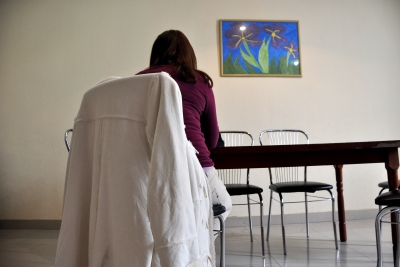Life after Violence
Date:
It has already been two years since 35-year-old Tamuna’s morning routine changed so significantly. She now gets her children ready for school and then hurries to work herself as an office manager.

Survivor of domestic violence; Photo: Radio Liberty/Mzia Saganelidze
Tamuna was feeling hopeless, but the organization provided her with information on vacancies that matched her background and work experience. They also offered her information on women’s social and economic rights and skills-building courses. Moreover, she participated in the service and sales trainings conducted by PMO, the private company collaborating with UN Women and Amagdari by providing pro bono trainings.
“I received so much support at Amagdari,” remarks Tamuna. “This was a time when I needed an incentive most of all. I always tried to learn and attended trainings, which were very important for me. I felt that the organization was standing by my side. Without going through all these stages, I would not have had the courage to apply for a managerial position.”
Amagdari has been a partner of UN Women since 2010 in the framework of the UN Joint Programme for Gender Equality, funded by the Government of Sweden. As part of this partnership, 900 beneficiaries received professional counselling and attended trainings and 396 found employment between 2010 and 2016.
“Our activities aim to provide socioeconomic rehabilitation and support to women survivors of violence,” notes Nino Shioshvili, director of Amagdari. “The existence of shelters is also very important, but just escaping a violent husband or partner is not a solution to the problem. It is no less important to make women economically independent and self-confident in order to really change their lives. I am grateful to those women who succeeded in this with our support.”
Amagdari has supported many women with stories like Tamuna’s. Keti, who is 29 years old, is one of their active beneficiaries. Like Tamuna, Keti left her violent partner two years ago. While her psychological state became worse when she lost her job, she did not become desperate; instead, she started to look for organizations that supported survivors of domestic violence. First, she went to the non-governmental organization Anti-Violence Network of Georgia, where she received support and learned about Amagdari. As she recalls, she was confused and pessimistic, despite having a higher education egree and work experience. However, the organization placed her in training programmes that matched her education, intellectual potential and diverse skills. Keti successfully finished a training course in service and sales management offered by PMO and attended a training on women’s social and economic rights.
Alongside the trainings, Keti was applying for job vacancies and eventually found a job as an operator. She said that, with the support of Amagdari, she regained her self-confidence as she became successful, and she recently changed jobs to advance her career. However, Keti has not stopped using the services of Amagdari, continuing to receive qualified counselling and consultations. “I still attend Amagdari’s trainings with pleasure,” she shares. “I have met many people who are in the same situation, and we have shared our heartaches with one another. It is very important that others understand your problem. This is when you realize that you are not alone.”
It is not uncommon for beneficiaries to continue to visit and benefit from the services of Amagdari, particularly to receive information on employment opportunities and to share their survival stories and experiences with newcomers. There is a working group of beneficiaries at Amagdari that actively works to develop new initiatives and proposals and meets with women who have defeated domestic and intimate partner violence and are now starting a new and independent life.